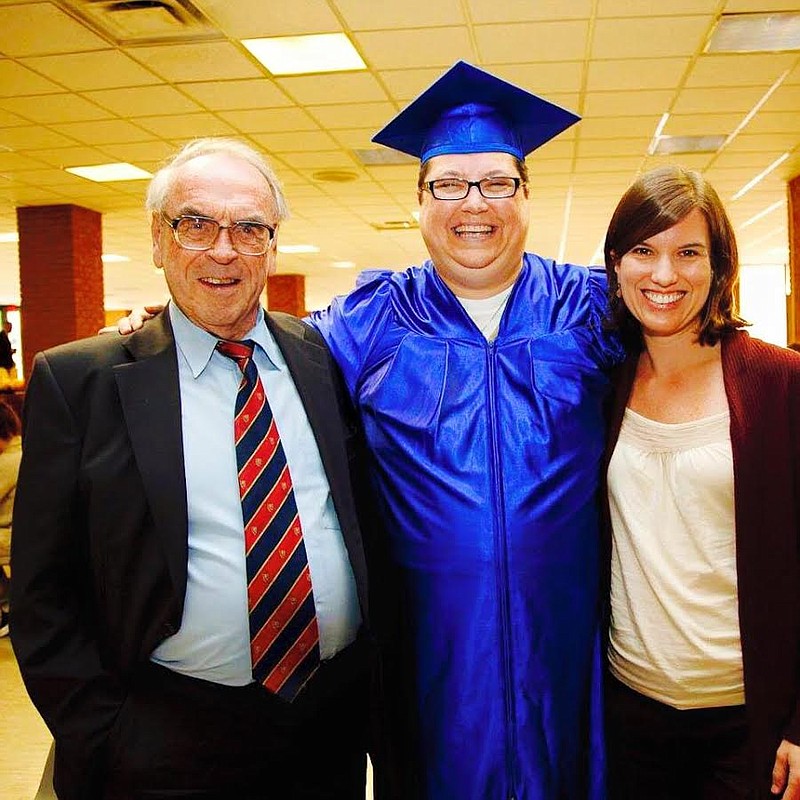In 1998, Kelly Gissendaner was convicted of plotting the murder of her husband. The state of Georgia sentenced her to death.
Monday evening, as the sun sets over Georgia, the state plans to execute Gissendaner.
Guards will take her from her 9-by-12 cell, where all her possessions fit on three small prison shelves, to another room with white walls and a tile floor and a medical gurney. It will be the last walk of her life. They will strap her down, swab clean her arms, then inject her with lethal chemicals that will shut down her lungs, her organs, her heart, her brain.
When the state kills her, it will be executing a redeemed and beloved daughter of God.
"She is a totally transformed person," said Dr. Jenny McBride.
McBride, who graduated from Baylor School in 1995, is a leading theologian, activist and author and the current Regents Chair of Ethics at Wartburg College in Waverly, Iowa. In 2010, as part of a program created by seminaries and universities near Atlanta, she also taught theology courses to female inmates in Georgia.
That's where she met Gissendaner.
"I was teaching her through the bars," McBride said.
There, Gissendaner fell in love with God. She signed up for 13 different courses. She became pen-pal friends with German theologian Jurgen Moltmann. She was a shipwrecked woman finally finding land.
"I have learned to place my hope in the God I now know, the God whose plans and promises are made known to me in the whole story of the life, death and resurrection of Jesus," she said during her graduation speech.
As part of her death row ministry, McBride wanted to celebrate the eucharist with Gissendaner. The prison forbade outside bread, juice or wine.
So McBride brought quarters for the vending machine. Death row then became a holy space, as prisoner and theologian celebrated a eucharist of Cheetos, diet Coke and cheeseburgers.
"There in that burger and Coke, Jesus made himself immediate to us," McBride writes in her forthcoming book.
That is the Gospel message: Christ found in the dirtiest and dimmest of places, as the least of these encounter a God whose love falls on the just and unjust, on the Saul who once killed Christians, and the Gissendaner who once helped kill her husband.
Both become putty in the arms of God.
Both become the message of God to the world.
"We can see in Kelly Gissendaner a truly redeemed person," one minister told Gissendaner's attorneys.
Days ago, Gissendaner's attorneys presented her plea for mercy to the Georgia Board of Pardons and Paroles. It is 54 pages of praise from dozens of guards, wardens, inmates, educators and ministers.
"Kelly Gissendaner is a peacemaker and has many times made the job safer for me and my staff," one guard said. "I humbly ask the Parole Board ... to please commute Kelly Gissendaner's sentence from death to life in prison."
"She has been a role model to people like me," one inmate said. "Without her light shining, this world would be a bleak place."
Gissendaner listens, whispers, prays, heals, cries, counsels, teaches and ministers to other inmates. She shares food with inmates who have none. She talks to troubled youth. One officer told about two inmates who were most violent -- spitting, kicking, throwing feces, screaming, almost like Gospel lunatics.
Those prisoners listened to Gissendaner.
"She would talk to them and get them calmed down," the guard said.
She has confessed her crime and is remorseful. Her own children beg Georgia to spare her life.
"Please grant her clemency so my brothers and I will not have to face yet another terrible loss," her daughter wrote.
The parole board said no.
By refusing to grant clemency and mercy to Gissendaner, the state of Georgia has revealed its death penalty system for what it is -- a machine of bloodlust, so blind it cannot recognize the transformation before it. Killing Gissendaner is exactly what the Roman Empire would have done.
"Jesus quite literally was a convicted criminal and a victim of the death penalty," McBride said. "And he remains in solidarity with all other victims of state violence."
Gissendaner's execution was originally scheduled for last week. Georgia postponed it because of snowstorms, the way you would a birthday party or a Braves game.
Yet Georgia refuses to postpone her execution because of mercy.
Contact David Cook at dcook@timesfreepress.com or 423-757-6329. Follow him on Facebook and Twitter at DavidCookTFP.

